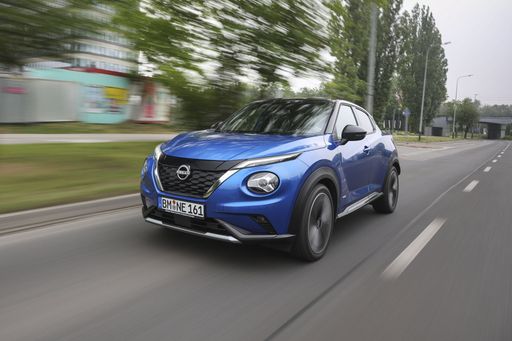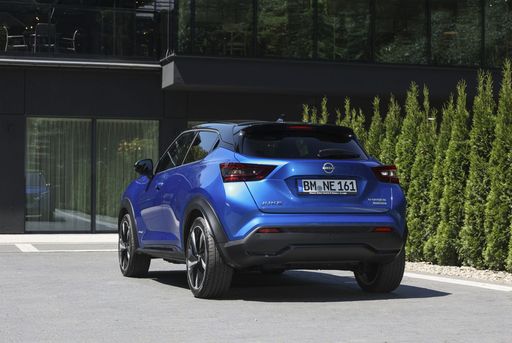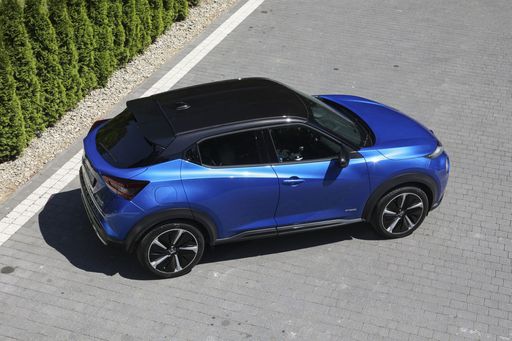Hyundai Bayon vs Nissan Juke - Differences and prices compared
Compare performance (90 HP vs 143 HP), boot space and price (20100 £ vs 21400 £ ) at a glance. Find out which car is the better choice for you – Hyundai Bayon or Nissan Juke?
Costs and Efficiency:
When it comes to price and running costs, the biggest differences usually appear. This is often where you see which car fits your budget better in the long run.
Hyundai Bayon has a slight advantage in terms of price – it starts at 20100 £ , while the Nissan Juke costs 21400 £ . That’s a price difference of around 1328 £.
Fuel consumption also shows a difference: Nissan Juke manages with 4.70 L and is therefore clearly perceptible more efficient than the Hyundai Bayon with 5.80 L. The difference is about 1.10 L per 100 km.
Engine and Performance:
Power, torque and acceleration say a lot about how a car feels on the road. This is where you see which model delivers more driving dynamics.
When it comes to engine power, the Nissan Juke has a distinct edge – offering 143 HP compared to 90 HP. That’s roughly 53 HP more horsepower.
In acceleration from 0 to 100 km/h, the Nissan Juke is to a small extent quicker – completing the sprint in 10.10 s, while the Hyundai Bayon takes 11.90 s. That’s about 1.80 s faster.
There’s also a difference in torque: Nissan Juke pulls a bit stronger with 200 Nm compared to 172 Nm. That’s about 28 Nm difference.
Space and Everyday Use:
Cabin size, boot volume and payload all play a role in everyday practicality. Here, comfort and flexibility make the difference.
Both vehicles offer seating for 5 people.
In curb weight, Hyundai Bayon is barely noticeable lighter – 1175 kg compared to 1274 kg. The difference is around 99 kg.
In terms of boot space, the Nissan Juke offers barely noticeable more room – 422 L compared to 411 L. That’s a difference of about 11 L.
When it comes to payload, Hyundai Bayon barely noticeable takes the win – 460 kg compared to 427 kg. That’s a difference of about 33 kg.
Who wins the race in the data check?
The Nissan Juke sits well ahead of its rival in the objective data comparison.
This result only shows which model scores more points on paper – not which of the two cars feels right for you.
Costs and Consumption
View detailed analysis
Engine and Performance
View detailed analysis
Dimensions and Body
View detailed analysis

Nissan Juke
Hyundai Bayon
The Hyundai Bayon slips neatly between city runabout and small SUV, offering surprising practicality and a fresh, confident design that stands out in urban traffic. It's an easy buy for shoppers who want smart packaging, tidy handling and a dash of personality without fuss — a sensible little crossover that makes everyday driving a bit more enjoyable.
details




Nissan Juke
The Nissan Juke is a pocket-sized crossover that refuses to blend in, with quirky styling and a cheeky stance that turns heads at every traffic light. It’s ideal for shoppers who value personality and nimble urban driving over maximum practicality, delivering surprising pep and a well-equipped feel for everyday fun.
details



Costs and Consumption |
|
|---|---|
|
Price
20100 - 25800 £
|
Price
21400 - 30100 £
|
|
Consumption L/100km
5.80 L
|
Consumption L/100km
4.7 - 6 L
|
|
Consumption kWh/100km
-
|
Consumption kWh/100km
-
|
|
Electric Range
-
|
Electric Range
-
|
|
Battery Capacity
-
|
Battery Capacity
0.60 kWh
|
|
co2
130 - 132 g/km
|
co2
107 - 136 g/km
|
|
Fuel tank capacity
-
|
Fuel tank capacity
46 L
|
Dimensions and Body |
|
|---|---|
|
Body Type
SUV
|
Body Type
SUV
|
|
Seats
5
|
Seats
5
|
|
Doors
-
|
Doors
5
|
|
Curb weight
1175 - 1200 kg
|
Curb weight
1274 - 1405 kg
|
|
Trunk capacity
411 L
|
Trunk capacity
354 - 422 L
|
|
Length
-
|
Length
4210 mm
|
|
Width
1775 mm
|
Width
1800 mm
|
|
Height
-
|
Height
1593 mm
|
|
Max trunk capacity
-
|
Max trunk capacity
1237 - 1305 L
|
|
Payload
450 - 460 kg
|
Payload
405 - 427 kg
|
Engine and Performance |
|
|---|---|
|
Engine Type
Petrol
|
Engine Type
Petrol, Full Hybrid
|
|
Transmission
Manuel, Automatic
|
Transmission
Manuel, Automatic
|
|
Transmission Detail
Manual Gearbox, Dual-Clutch Automatic
|
Transmission Detail
Manual Gearbox, Dual-Clutch Automatic, Automatic Gearbox
|
|
Drive Type
Front-Wheel Drive
|
Drive Type
Front-Wheel Drive
|
|
Power HP
90 HP
|
Power HP
114 - 143 HP
|
|
Acceleration 0-100km/h
11.9 - 13.3 s
|
Acceleration 0-100km/h
10.1 - 11.8 s
|
|
Max Speed
-
|
Max Speed
166 - 180 km/h
|
|
Torque
172 Nm
|
Torque
200 Nm
|
|
Number of Cylinders
3
|
Number of Cylinders
3 - 4
|
|
Power kW
66 kW
|
Power kW
84 - 105 kW
|
|
Engine capacity
998 cm3
|
Engine capacity
999 - 1598 cm3
|
General |
|
|---|---|
|
Model Year
2025
|
Model Year
2024
|
|
CO2 Efficiency Class
D
|
CO2 Efficiency Class
D, E, C
|
|
Brand
Hyundai
|
Brand
Nissan
|
What drivetrain options does the Hyundai Bayon have?
The Hyundai Bayon is available as Front-Wheel Drive.




